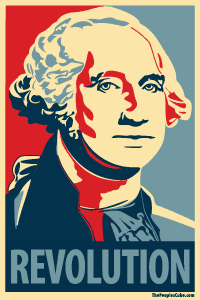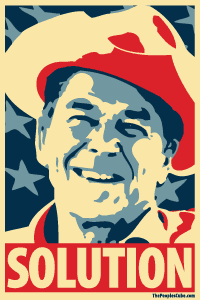By Stephen Moore & Peter Ferrara | April 2012 | The American Spectator
Fairness requires that President Obama read up on his Kurt Vonnegut.
The year was 2081, and everybody was finally equal. They weren’t only equal before God and the law. They were equal every which way. Nobody was smarter than anybody else. Nobody was better looking than anybody else. Nobody was stronger or quicker than anybody else. All this equality was due to the 211th, 212th and 213th Amendments to the Constitution, and to the unceasing vigilance of agents of the United States Handicapper General.
So began Kurt Vonnegut’s 1961 short story “Harrison Bergeron.” In that brave new world, the government forced each individual to wear “handicaps” to offset any advantage he had, so everyone could be truly and fully equal. Beautiful people had to wear ugly masks to hide their good looks. The strong had to wear compensating weights to slow them down. Graceful dancers were burdened with bags of bird shot. Those with above-average intelligence had to wear government transmitters in their ears that would emit sharp noises every 20 seconds, shattering their thoughts “to keep them…from taking unfair advantage of their brains.”
But Harrison Bergeron, who was far above average in everything, was a special problem. Vonnegut explained, “Nobody had ever borne heavier handicaps.… Instead of a little ear radio for a mental handicap, he wore a tremendous pair of earphones, and spectacles with thick wavy lenses.” To offset his strength, “Scrap metal was hung all over him,” to the point that the seven-foot-tall Harrison “looked like a walking junkyard.”
The youthful Harrison did not accept these burdens easily, so he had been jailed. But with his myriad advantages and talents, he had broken out. An announcement on TV explained the threat: “He is a genius and an athlete…and should be regarded as extremely dangerous.”
Harrison broke into a TV studio, which was broadcasting the performance of a troupe of dancing ballerinas. On national television, he illegally cast off each one of his handicaps. Then he did the same for one of the ballerinas, and then the orchestra, which he commanded to play. To shockingly beautiful chords, Harrison and the ballerina began to dance.
Not only were the laws of the land abandoned, but the laws of gravity and the laws of motion as well.…The studio ceiling was thirty feet high, but each leap brought the dancers nearer to it. It became their obvious intention to kiss the ceiling. They kissed it. And then, neutralizing gravity with love and pure will, they remained suspended in air inches below the ceiling, and they kissed each other for a long, long time.
SOCIAL SAFETY NETS that provide basic help for the needy to prevent human suffering are easily justifiable on moral grounds. Nearly everyone supports them to prevent severe hardship among those disabled, widowed, orphaned, or even just temporarily down on their luck. In modern and wealthy societies like ours, there is broad voter consent to such policies, which ensure people do not suffer deprivation of the necessities of life: food, shelter, and clothing. This recognizes we have a moral obligation to help our fellow man. It’s always an open question how much of that should fall to private charity and how much should be done through government taxation. That said, the truth is, such safety nets, if focused on the truly needy and designed to rely on modern markets and incentives, would not be costly compared to the immense wealth of our society.
But once such policies are established, going further—taking from some by force of law what they have produced and consequently earned, and giving to others merely to make incomes and wealth more equal—is not justifiable. Vonnegut’s story helps explain why.
First, achieving true and comprehensive equality would require violating personal liberty, as the talented and capable must be prevented from using their advantages to get ahead. Under this philosophy, the most productive must be treated punitively through high tax rates simply because they used their abilities to produce more than others. What we have just described is a progressive tax system. Work and produce a little bit, and we take 10 percent. Work and produce more, and we take 20 percent, and so on. Some societies take as much as 90 percent of the marginal output, as the U.S. did after World War II.
In a society where men and women are angels who always put the welfare of others ahead of their own, this system—from each according to his ability, to each according to his need—might even work. High tax rates wouldn’t have any negative consequences because everyone would work for everyone else’s benefit. Society would be like one, large commune, with everyone working for the common good. The ambitious, hard worker would get the same pay as the one who sleeps in and lives a lazy lifestyle. Output would be high, and we would have almost complete equality of outcome.
The problem, of course, is that men are not angels. We are driven by self-interest-not entirely, of course, but enough that giving everyone an equal share despite unequal contributions would severely deter work incentives. This is why in all those societies that have tried to enforce the more extreme vision of mandatory equality, totalitarian governments and poverty have emerged. And, by the way, in practice these societies are not very equal either. Richer and freer countries tend to have smaller income disparities than poorer and less free nations.
Moreover, as Vonnegut’s story illustrates, inequalities of wealth and income are not the only important differences in society. If equality is truly a moral obligation, then inequalities of beauty, intelligence, strength, grace, talent, etc. logically all should be leveled as well. That would require some rather heavy-handed government intervention. It is not fair that LeBron James has a 40-inch vertical leap, and we have a 4-inch vertical leap (combined). It is not fair that some have high IQs, and others are below average. It is not fair that Christie Brinkley is beautiful, that some people are born with photographic memories, that one person gets cancer and the next one doesn’t. We Americans were born in a land of opportunity and wealth, while billions around the world are born into poverty and squalor. We won the ultimate lottery of life just by being born in this great and rich country. Where is the justice in that?
THE GOAL OF A SOCIETY should not and cannot be to make people equal in outcomes, an impossibility given the individual attributes with which we were each endowed by our creator. It is the opposite of justice and fairness to try to equalize outcomes based on those attributes. It is not fair to the beautiful to force them to wear ugly masks. It is not fair to the strong to punish them by holding them down with excess weights. It is not fair to the graceful and athletic to deprive them of their talents. In the same way, it is not fair to the productive, the risk taking, or the hard working, to deprive them of what they have produced, merely to make them equal to others who have worked less, taken less risk, and produced less.
Read the full article here.
Related Articles
- Free Market Fairness (resnikoff.wordpress.com)
- Kurt Vonnegut: The Art of Fiction No. 64 (longform.org)
- Kurt Vonnegut, We Miss You. (marclougee.com)
- Kurt Vonnegut explains drama (timbauer.wordpress.com)
- Review: Player Piano by Kurt Vonnegut (roofbeamreader.net)
- Books on Record: Vonnegut Reads “Breakfast of Champions” (wfmu.org)
- “How do humanists feel about Jesus? I say of Jesus, as all humanists do, ‘If what he said is good, and so much of it is absolutely beautiful, what does it matter if he was God or not? – Kurt Vonnegut ‘Render to Caesar, Extraordinarily (rodfusco.wordpress.com)
- Where did the time go? (itsthecolleenlife.wordpress.com)
- Vonnegut’s Letter: Slaughterhouse Five (myintelligentlife.wordpress.com)








